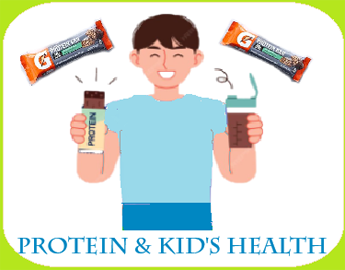Is Your Kid Getting Too Much Protein?
Children need protein for growth, development, and a strong immune system. However, as with most things, too much is not actually a good thing at all.
Excess protein won’t make kids grow faster or build more muscle, but it can lead to some side effects.

Children need high-quality protein containing all essential amino acids to support muscle growth, bone development, and overall body repair.
A balanced intake from both animal and plant sources ensures children get the nutrients needed for optimal growth.
Ideal protein sources for kids include:
whole foods such as lean meat, poultry, fish, eggs, dairy products, and soy. They provide not only high-quality protein but also omega-3 fatty acids, essential vitamins and minerals like iron, calcium, and vitamin B12, which are vital for growth, brain development, and strong bones.
Here is how much protein kids need each day, as recommended by the National Institutes of Health (NIH):
Surveys suggest that, in most Western countries, including the U.S., children already consume two to three times the protein they need each day.
The risk of kids getting too much protein: What are some potential side effects of excessive protein?
While protein is essential for children’s growth and development, too much of it can actually harm their health. Many believe that extra protein will lead to faster growth or stronger muscles, but the body can only use what it needs—any excess puts unnecessary strain on vital organs.
-
✅ Kidney damage: Consuming too much protein—particularly from animal sources like red meat—can increase acid and toxin levels in the body. This extra load forces the kidneys to work harder to filter waste, raising the risk of kidney stones and long-term strain on kidney function.
-
✅ Liver damage: When the liver processes protein, it produces nitrogen as a byproduct. Excessive nitrogen levels can overwhelm the liver, making it harder to eliminate waste and toxins, and reducing its ability to break down essential nutrients.
-
✅ Digestive issues: Excess protein, especially from certain sources, can upset a child’s digestion, leading to constipation, diarrhea, bloating, and discomfort.
-
✅ Weight gain: Excess protein beyond the body’s needs can add extra calories, leading to unwanted weight gain, if it’s on top of an already complete diet.
-
✅ Excessive satiety: Too much protein can cause early fullness, making it harder for underweight children to eat enough other nutrient-rich foods for growth.
Kids may need extra protein if they:
-
Show slower-than-expected growth or have been diagnosed with growth faltering,
-
Follow a vegan or vegetarian diet, and
-
Have conditions such as inflammatory bowel disease or malabsorption syndrome that reduce nutrient absorption.
Even in these cases, health experts advise choosing whole food sources of protein over powders and supplements for the healthiest results.
Should you give your child protein supplements for an extra boost?
Health experts generally say NO. The priority should be meeting protein needs through balanced, whole-food meals rather than powders or processed products.
Still, high-protein diets have become a growing trend among children, teens, and their caregivers, especially for young athletes aiming to bulk up and build strength. Many turn to protein-heavy options like powders, bars, shakes, smoothies, and other supplements.
These concentrated products can lead kids to easily exceed their protein and calorie needs. A high-protein shake may match a chicken breast in protein but offers less satiety, leaving kids hungrier and more likely to snack on less nutritious foods.
Bottom line–Whole foods are generally the healthier, more satisfying option even in kids! Medical Disclaimer.
Read further on:
≺≺ What food is most effective for moderating blood sugar?
≺≺ How Do Sugary Meals and Beverages Harm Dental Health?
≺≺ How are artificial sweeteners made?
≺≺ What health problems are linked to consuming corn syrup?
≺≺ What are the four enemies of blood sugar?
≺≺ What Is the Ketogenic Diet? Is the Keto Diet Right for Everyone?
≺≺ What is the Okinawan diet? What is the secret behind Okinawan long life expectancy?
≺≺ What are the four enemies of blood sugar?
≺≺ EWG’s- The Clean Fifteen: Fruits and Vegetables with the Lowest Pesticide Levels.
≺≺ What are antioxidants? How antioxidants in the fruits and vegetables help in preventing cancers and diseases?
≺≺ What foods should people with high blood pressure avoid?
≺≺ How can I reduce the risk of cancer-causing chemicals when cooking or grilling meat?
≺≺ What happens to my blood vessels when I gain weight?
≺≺ What type of exercise is best for lowering my blood sugar?
≺≺ What impact can sitting for long periods have on my health?
≺≺ How toxic are the nitrites used in curing processed meats?
≺≺ What foods can lower prostate cancer risk?
≻≻ Watch this page for more such informative articles on Health, Nutrition, and Wellness.
≻≻-Back to Home page.
Further reading (External Links opens in new window):
≺≺- Cleveland Clinic- Protein and Kids: How Much Is Too Much?.

